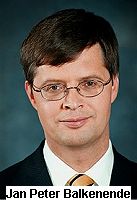UNICE outlines its expectations to the Dutch Presidency
A delegation from UNICE, the union of industrial and employers' confederations of Europe, met with Dutch Prime Minister and current President of the European Council, Jan Peter Balkenende, and his Minister for Economic Affairs, Laurens Jan Brinkhorst, on 7 July to tell them what European business expects from the Dutch EU Presidency. The defining theme chosen by UNICE for the discussion was 'implementing the Lisbon strategy through better governance, better regulation and better communication.' The delegation stressed that the Dutch Presidency comes at a critical moment for the EU's 10 year competitiveness strategy: 'As it takes place at the start of the new political cycle 2004 to 2009, the Dutch EU Presidency is in a pivotal position to ensure implementation of the Lisbon strategy during its remaining timeframe until 2010,' reads the UNICE document handed to the Dutch Premier. As far as UNICE is concerned, the enlargement of the EU to 25 Member States on 1 May only served to make the Lisbon agenda more relevant. '[N]ot only will the internal market of 25 countries offer tremendous opportunities for all European citizens,' reads the document. 'In addition, enlargement creates healthy pressure for structural reforms, as many of the new Member States have undergone profound changes in their economic structures, and are catching up with much more dynamic growth rates than the EU average.' Having called on the Presidency to deliver better governance, regulation and communication, the delegation, led by UNICE president Jürgen Strube, outlined its vision in more detail. In terms of governance, it called on European institutions to focus all their policies on the objective of enhancing competitiveness, 'not because it is an end in itself, but because it is the indispensable basis for sustainable development and well being.' UNICE added that it was confident that the mid-term review of the Lisbon Strategy, currently being drafted by former Dutch Prime Minister Wim Kok's high level group, would support such a refocusing of the strategy. UNICE called for further measures aimed at enhancing governance, including the appointment of a Competitiveness Commissioner, tasked with overseeing all Commission work affecting Europe's competitiveness, the development of the Competitiveness Council's mandate to evaluate the competitiveness related decisions of other Council formations, and the reallocation of EU funds towards areas that enhance competitiveness as part of the financial perspectives for 2007 to 2013. Referring to the Competitiveness Council, Mr Strube said that it 'must give clear statements on whether legislative proposals would enhance competitiveness.' He added that UNICE was keen to continue the tradition started during the Irish Presidency to hold meetings at political and technical level ahead of the Competitiveness Councils. Ensuring better regulation is seen as a priority by the Dutch Presidency, a fact welcomed by UNICE. In order to secure it, the union would like to see mandatory impact assessments and stakeholder consultations for all proposed legislation, funded by the EU but carried out by an independent body. Action plans with ambitious targets and deadlines should also be adopted to reduce red tape, UNICE added. The third and final heading is communication, and UNICE urges EU institutions to initiate a European communication strategy on the Lisbon agenda, to be implemented by national governments and parliaments. 'The urgency for change in Europe and the benefits of progress are not yet sufficiently accepted among European citizens. The Lisbon strategy remains largely unknown,' it argues. Before the end of the meeting, the UNICE delegation took the opportunity to express its views on a number of specific policy issues. On the EU's new package of chemicals legislation, UNICE noted that 'it is crucial that the practical consequences of REACH for all industrial activities are completely catalogued and fully understood,' particularly its effect on European innovation. The delegation then reminded Mr Balkenende that the adoption of a Community Patent remains critical for European business, and recommended a single language solution (English) to the current political impasse over translations. UNICE concluded by revealing that the European business community would expand its future vision of Europe in the 'UNICE memorandum to the EU institutions - political cycle 2004-2009' which will be published in September.
Countries
Netherlands



